Course Name: Skill Set Gap Analysis in Financial Services Industry
VerifiedAdded on 2023/06/07
|6
|1435
|308
Report
AI Summary
This report provides a comprehensive analysis of the skill set gaps within the financial services industry, examining the evolving demands across banking, insurance, and asset management sectors. It highlights the increasing need for specialized skills such as product and sector knowledge, quantitative abilities, risk management, and digital expertise, including AI and blockchain. The report emphasizes the impact of technological advancements and globalization on workforce requirements, underscoring the importance of continuous skill development and adaptability. It also details the specific skill gaps in each sector, such as the need for improved leadership in banking, technical and risk management skills in insurance, and investment and research abilities in asset management. The author reflects on their own skill development, focusing on research and quantitative abilities, and outlines strategies to bridge the identified gaps. The report concludes by stressing the importance of organizational agility, adaptability, and a technically proficient workforce to meet the challenges of the rapidly changing financial landscape. The report references several sources to support its findings.
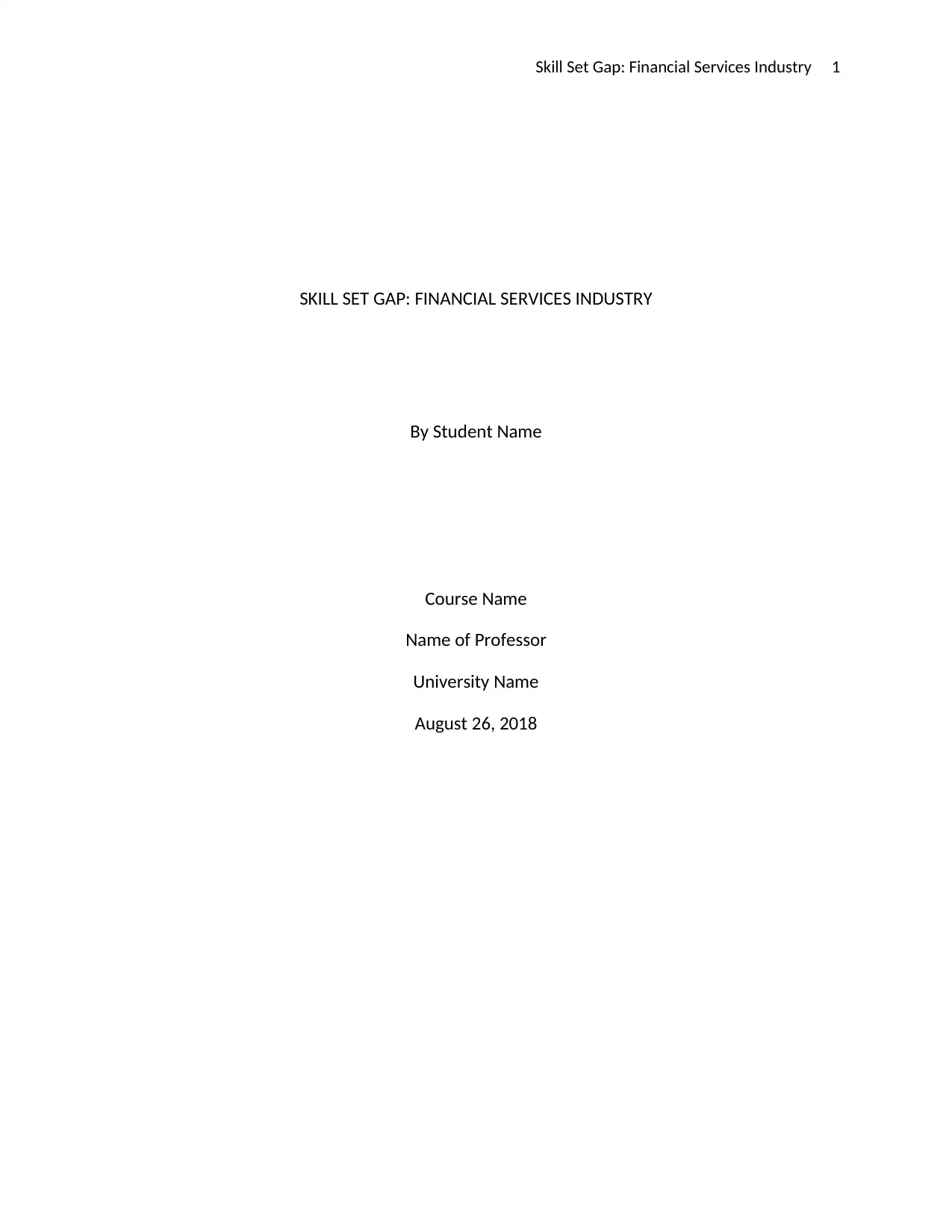
Skill Set Gap: Financial Services Industry 1
SKILL SET GAP: FINANCIAL SERVICES INDUSTRY
By Student Name
Course Name
Name of Professor
University Name
August 26, 2018
SKILL SET GAP: FINANCIAL SERVICES INDUSTRY
By Student Name
Course Name
Name of Professor
University Name
August 26, 2018
Paraphrase This Document
Need a fresh take? Get an instant paraphrase of this document with our AI Paraphraser
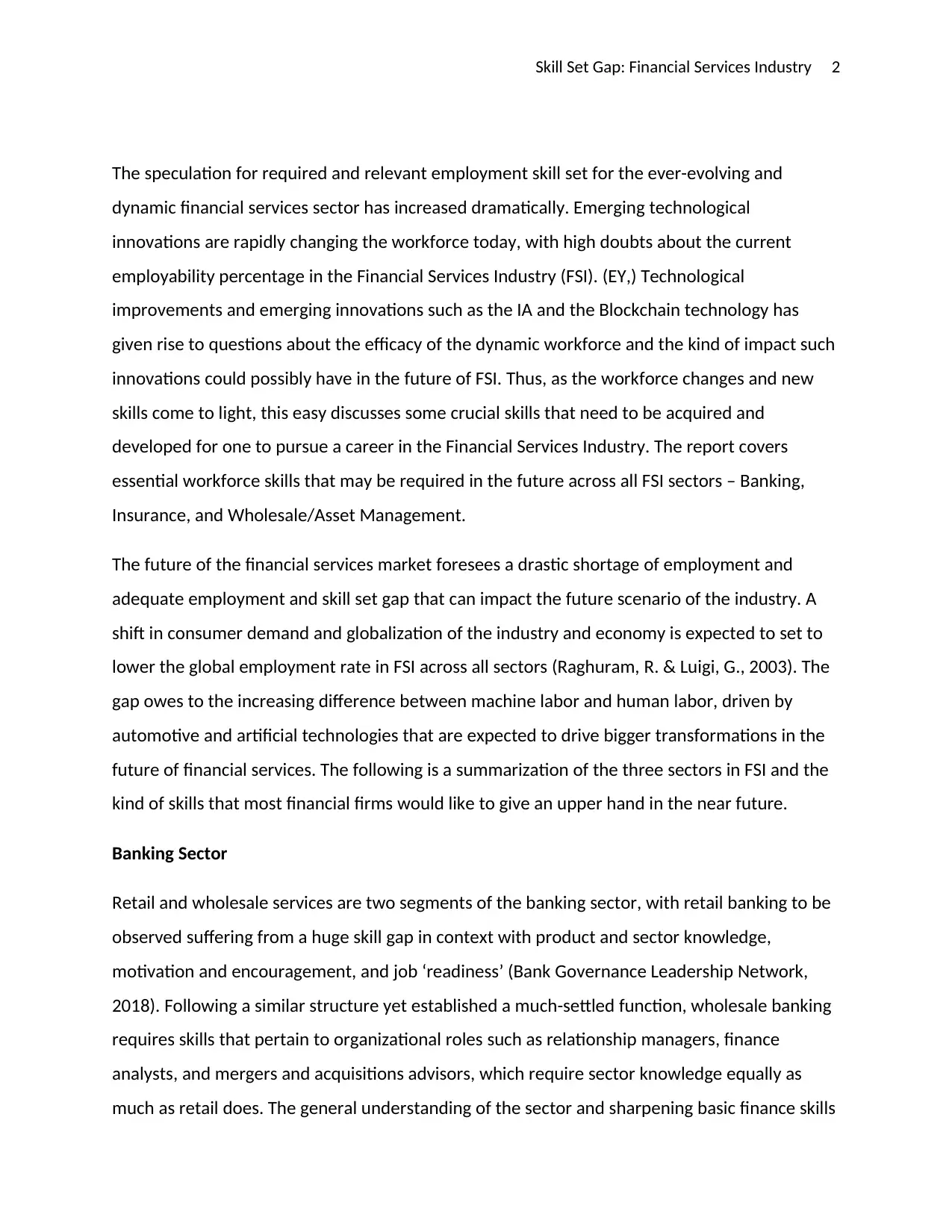
Skill Set Gap: Financial Services Industry 2
The speculation for required and relevant employment skill set for the ever-evolving and
dynamic financial services sector has increased dramatically. Emerging technological
innovations are rapidly changing the workforce today, with high doubts about the current
employability percentage in the Financial Services Industry (FSI). (EY,) Technological
improvements and emerging innovations such as the IA and the Blockchain technology has
given rise to questions about the efficacy of the dynamic workforce and the kind of impact such
innovations could possibly have in the future of FSI. Thus, as the workforce changes and new
skills come to light, this easy discusses some crucial skills that need to be acquired and
developed for one to pursue a career in the Financial Services Industry. The report covers
essential workforce skills that may be required in the future across all FSI sectors – Banking,
Insurance, and Wholesale/Asset Management.
The future of the financial services market foresees a drastic shortage of employment and
adequate employment and skill set gap that can impact the future scenario of the industry. A
shift in consumer demand and globalization of the industry and economy is expected to set to
lower the global employment rate in FSI across all sectors (Raghuram, R. & Luigi, G., 2003). The
gap owes to the increasing difference between machine labor and human labor, driven by
automotive and artificial technologies that are expected to drive bigger transformations in the
future of financial services. The following is a summarization of the three sectors in FSI and the
kind of skills that most financial firms would like to give an upper hand in the near future.
Banking Sector
Retail and wholesale services are two segments of the banking sector, with retail banking to be
observed suffering from a huge skill gap in context with product and sector knowledge,
motivation and encouragement, and job ‘readiness’ (Bank Governance Leadership Network,
2018). Following a similar structure yet established a much-settled function, wholesale banking
requires skills that pertain to organizational roles such as relationship managers, finance
analysts, and mergers and acquisitions advisors, which require sector knowledge equally as
much as retail does. The general understanding of the sector and sharpening basic finance skills
The speculation for required and relevant employment skill set for the ever-evolving and
dynamic financial services sector has increased dramatically. Emerging technological
innovations are rapidly changing the workforce today, with high doubts about the current
employability percentage in the Financial Services Industry (FSI). (EY,) Technological
improvements and emerging innovations such as the IA and the Blockchain technology has
given rise to questions about the efficacy of the dynamic workforce and the kind of impact such
innovations could possibly have in the future of FSI. Thus, as the workforce changes and new
skills come to light, this easy discusses some crucial skills that need to be acquired and
developed for one to pursue a career in the Financial Services Industry. The report covers
essential workforce skills that may be required in the future across all FSI sectors – Banking,
Insurance, and Wholesale/Asset Management.
The future of the financial services market foresees a drastic shortage of employment and
adequate employment and skill set gap that can impact the future scenario of the industry. A
shift in consumer demand and globalization of the industry and economy is expected to set to
lower the global employment rate in FSI across all sectors (Raghuram, R. & Luigi, G., 2003). The
gap owes to the increasing difference between machine labor and human labor, driven by
automotive and artificial technologies that are expected to drive bigger transformations in the
future of financial services. The following is a summarization of the three sectors in FSI and the
kind of skills that most financial firms would like to give an upper hand in the near future.
Banking Sector
Retail and wholesale services are two segments of the banking sector, with retail banking to be
observed suffering from a huge skill gap in context with product and sector knowledge,
motivation and encouragement, and job ‘readiness’ (Bank Governance Leadership Network,
2018). Following a similar structure yet established a much-settled function, wholesale banking
requires skills that pertain to organizational roles such as relationship managers, finance
analysts, and mergers and acquisitions advisors, which require sector knowledge equally as
much as retail does. The general understanding of the sector and sharpening basic finance skills
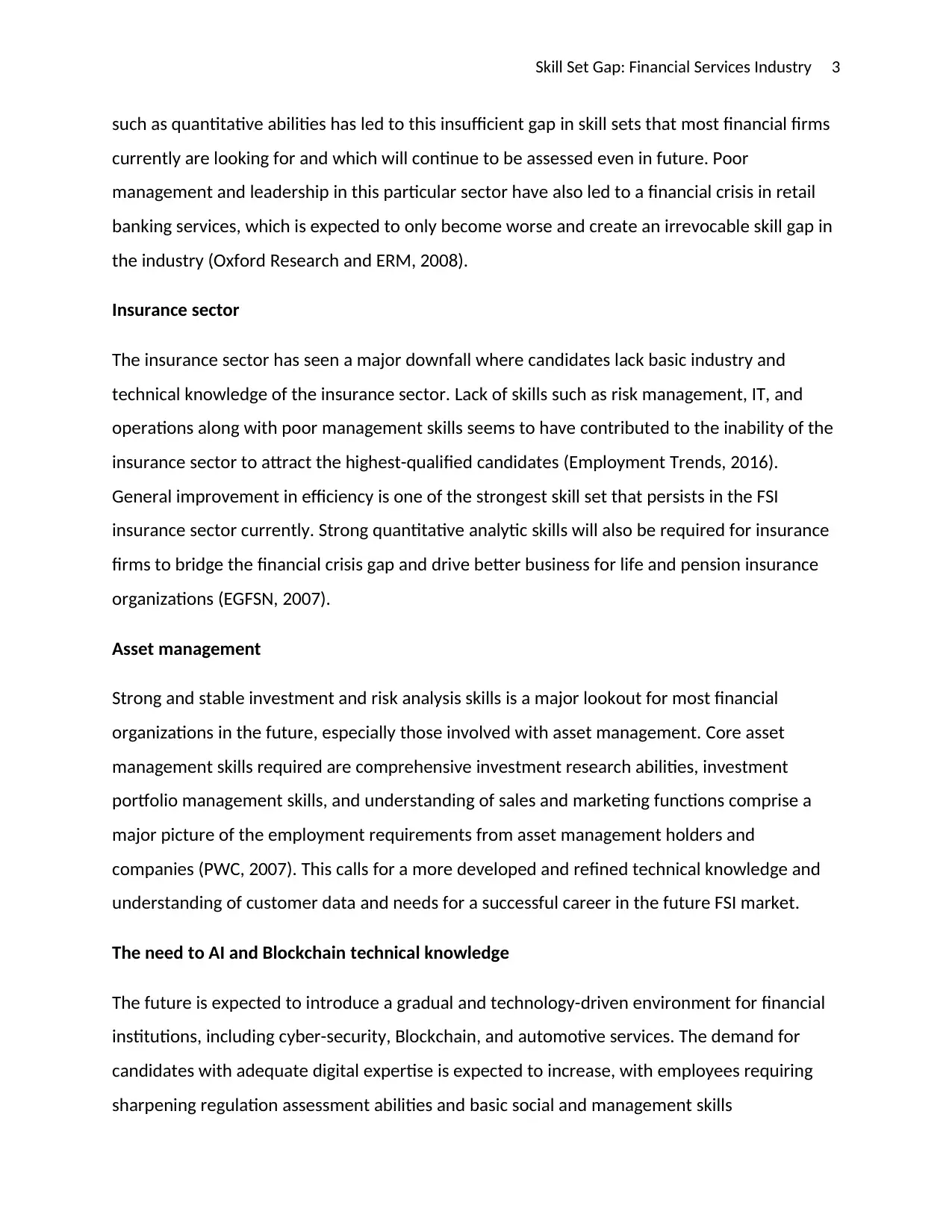
Skill Set Gap: Financial Services Industry 3
such as quantitative abilities has led to this insufficient gap in skill sets that most financial firms
currently are looking for and which will continue to be assessed even in future. Poor
management and leadership in this particular sector have also led to a financial crisis in retail
banking services, which is expected to only become worse and create an irrevocable skill gap in
the industry (Oxford Research and ERM, 2008).
Insurance sector
The insurance sector has seen a major downfall where candidates lack basic industry and
technical knowledge of the insurance sector. Lack of skills such as risk management, IT, and
operations along with poor management skills seems to have contributed to the inability of the
insurance sector to attract the highest-qualified candidates (Employment Trends, 2016).
General improvement in efficiency is one of the strongest skill set that persists in the FSI
insurance sector currently. Strong quantitative analytic skills will also be required for insurance
firms to bridge the financial crisis gap and drive better business for life and pension insurance
organizations (EGFSN, 2007).
Asset management
Strong and stable investment and risk analysis skills is a major lookout for most financial
organizations in the future, especially those involved with asset management. Core asset
management skills required are comprehensive investment research abilities, investment
portfolio management skills, and understanding of sales and marketing functions comprise a
major picture of the employment requirements from asset management holders and
companies (PWC, 2007). This calls for a more developed and refined technical knowledge and
understanding of customer data and needs for a successful career in the future FSI market.
The need to AI and Blockchain technical knowledge
The future is expected to introduce a gradual and technology-driven environment for financial
institutions, including cyber-security, Blockchain, and automotive services. The demand for
candidates with adequate digital expertise is expected to increase, with employees requiring
sharpening regulation assessment abilities and basic social and management skills
such as quantitative abilities has led to this insufficient gap in skill sets that most financial firms
currently are looking for and which will continue to be assessed even in future. Poor
management and leadership in this particular sector have also led to a financial crisis in retail
banking services, which is expected to only become worse and create an irrevocable skill gap in
the industry (Oxford Research and ERM, 2008).
Insurance sector
The insurance sector has seen a major downfall where candidates lack basic industry and
technical knowledge of the insurance sector. Lack of skills such as risk management, IT, and
operations along with poor management skills seems to have contributed to the inability of the
insurance sector to attract the highest-qualified candidates (Employment Trends, 2016).
General improvement in efficiency is one of the strongest skill set that persists in the FSI
insurance sector currently. Strong quantitative analytic skills will also be required for insurance
firms to bridge the financial crisis gap and drive better business for life and pension insurance
organizations (EGFSN, 2007).
Asset management
Strong and stable investment and risk analysis skills is a major lookout for most financial
organizations in the future, especially those involved with asset management. Core asset
management skills required are comprehensive investment research abilities, investment
portfolio management skills, and understanding of sales and marketing functions comprise a
major picture of the employment requirements from asset management holders and
companies (PWC, 2007). This calls for a more developed and refined technical knowledge and
understanding of customer data and needs for a successful career in the future FSI market.
The need to AI and Blockchain technical knowledge
The future is expected to introduce a gradual and technology-driven environment for financial
institutions, including cyber-security, Blockchain, and automotive services. The demand for
candidates with adequate digital expertise is expected to increase, with employees requiring
sharpening regulation assessment abilities and basic social and management skills
⊘ This is a preview!⊘
Do you want full access?
Subscribe today to unlock all pages.

Trusted by 1+ million students worldwide
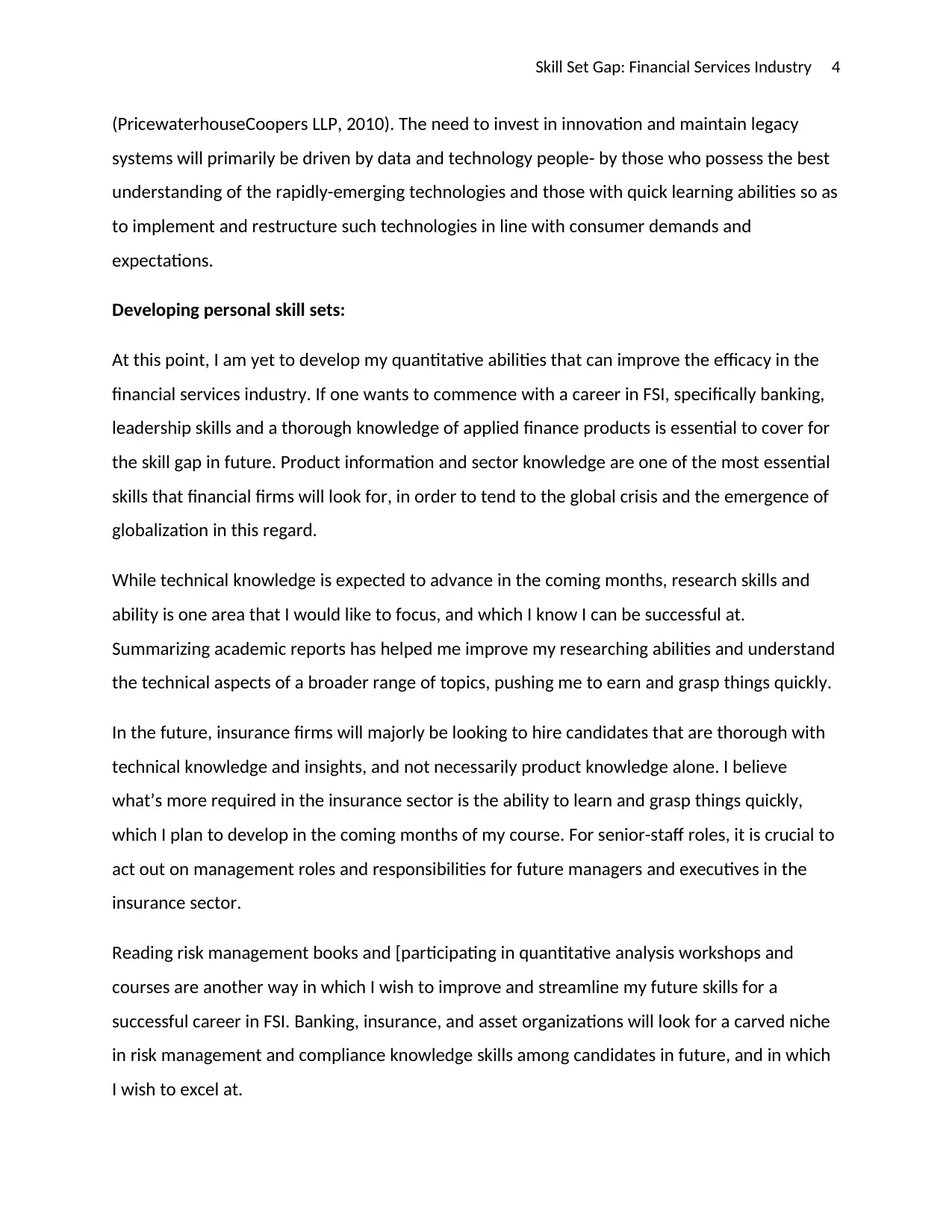
Skill Set Gap: Financial Services Industry 4
(PricewaterhouseCoopers LLP, 2010). The need to invest in innovation and maintain legacy
systems will primarily be driven by data and technology people- by those who possess the best
understanding of the rapidly-emerging technologies and those with quick learning abilities so as
to implement and restructure such technologies in line with consumer demands and
expectations.
Developing personal skill sets:
At this point, I am yet to develop my quantitative abilities that can improve the efficacy in the
financial services industry. If one wants to commence with a career in FSI, specifically banking,
leadership skills and a thorough knowledge of applied finance products is essential to cover for
the skill gap in future. Product information and sector knowledge are one of the most essential
skills that financial firms will look for, in order to tend to the global crisis and the emergence of
globalization in this regard.
While technical knowledge is expected to advance in the coming months, research skills and
ability is one area that I would like to focus, and which I know I can be successful at.
Summarizing academic reports has helped me improve my researching abilities and understand
the technical aspects of a broader range of topics, pushing me to earn and grasp things quickly.
In the future, insurance firms will majorly be looking to hire candidates that are thorough with
technical knowledge and insights, and not necessarily product knowledge alone. I believe
what’s more required in the insurance sector is the ability to learn and grasp things quickly,
which I plan to develop in the coming months of my course. For senior-staff roles, it is crucial to
act out on management roles and responsibilities for future managers and executives in the
insurance sector.
Reading risk management books and [participating in quantitative analysis workshops and
courses are another way in which I wish to improve and streamline my future skills for a
successful career in FSI. Banking, insurance, and asset organizations will look for a carved niche
in risk management and compliance knowledge skills among candidates in future, and in which
I wish to excel at.
(PricewaterhouseCoopers LLP, 2010). The need to invest in innovation and maintain legacy
systems will primarily be driven by data and technology people- by those who possess the best
understanding of the rapidly-emerging technologies and those with quick learning abilities so as
to implement and restructure such technologies in line with consumer demands and
expectations.
Developing personal skill sets:
At this point, I am yet to develop my quantitative abilities that can improve the efficacy in the
financial services industry. If one wants to commence with a career in FSI, specifically banking,
leadership skills and a thorough knowledge of applied finance products is essential to cover for
the skill gap in future. Product information and sector knowledge are one of the most essential
skills that financial firms will look for, in order to tend to the global crisis and the emergence of
globalization in this regard.
While technical knowledge is expected to advance in the coming months, research skills and
ability is one area that I would like to focus, and which I know I can be successful at.
Summarizing academic reports has helped me improve my researching abilities and understand
the technical aspects of a broader range of topics, pushing me to earn and grasp things quickly.
In the future, insurance firms will majorly be looking to hire candidates that are thorough with
technical knowledge and insights, and not necessarily product knowledge alone. I believe
what’s more required in the insurance sector is the ability to learn and grasp things quickly,
which I plan to develop in the coming months of my course. For senior-staff roles, it is crucial to
act out on management roles and responsibilities for future managers and executives in the
insurance sector.
Reading risk management books and [participating in quantitative analysis workshops and
courses are another way in which I wish to improve and streamline my future skills for a
successful career in FSI. Banking, insurance, and asset organizations will look for a carved niche
in risk management and compliance knowledge skills among candidates in future, and in which
I wish to excel at.
Paraphrase This Document
Need a fresh take? Get an instant paraphrase of this document with our AI Paraphraser
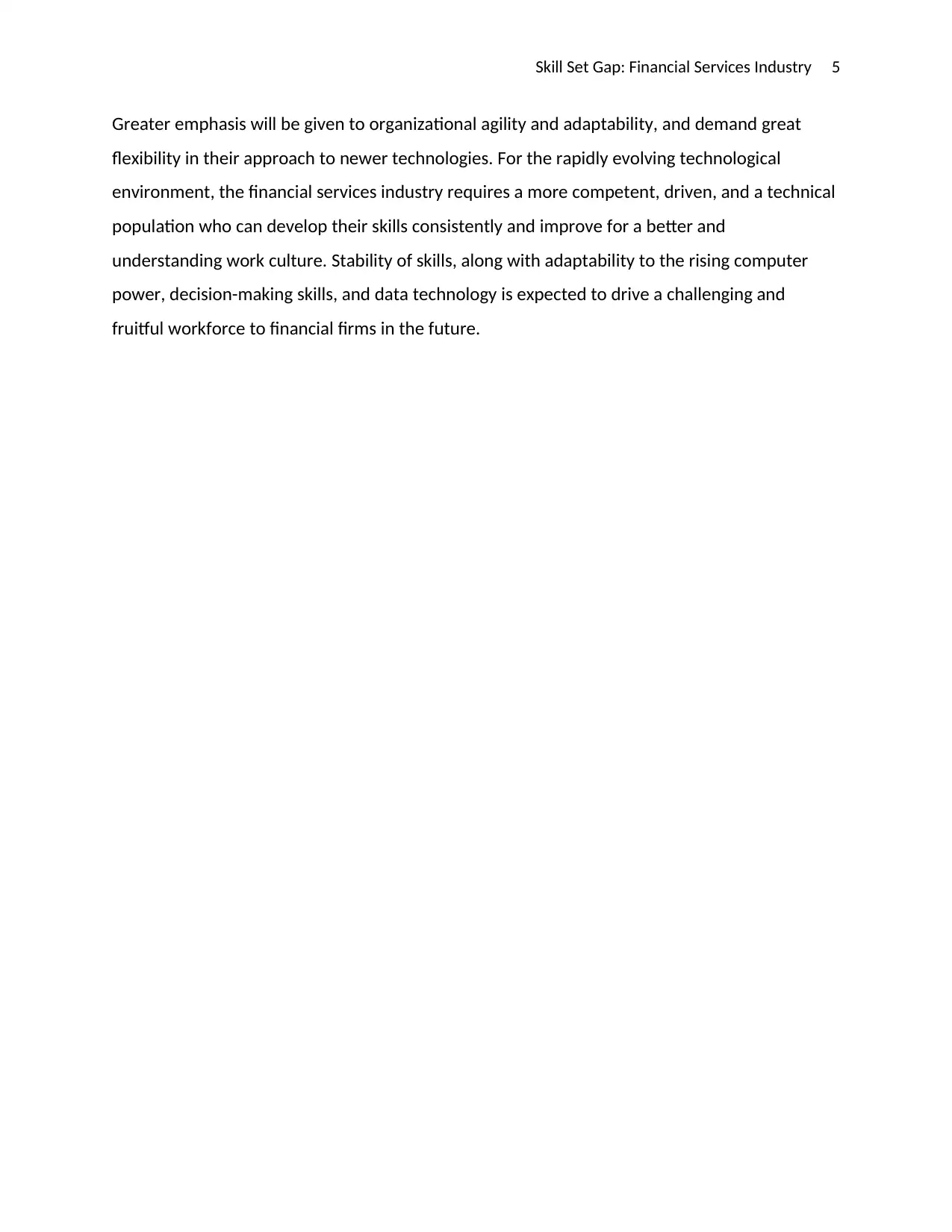
Skill Set Gap: Financial Services Industry 5
Greater emphasis will be given to organizational agility and adaptability, and demand great
flexibility in their approach to newer technologies. For the rapidly evolving technological
environment, the financial services industry requires a more competent, driven, and a technical
population who can develop their skills consistently and improve for a better and
understanding work culture. Stability of skills, along with adaptability to the rising computer
power, decision-making skills, and data technology is expected to drive a challenging and
fruitful workforce to financial firms in the future.
Greater emphasis will be given to organizational agility and adaptability, and demand great
flexibility in their approach to newer technologies. For the rapidly evolving technological
environment, the financial services industry requires a more competent, driven, and a technical
population who can develop their skills consistently and improve for a better and
understanding work culture. Stability of skills, along with adaptability to the rising computer
power, decision-making skills, and data technology is expected to drive a challenging and
fruitful workforce to financial firms in the future.
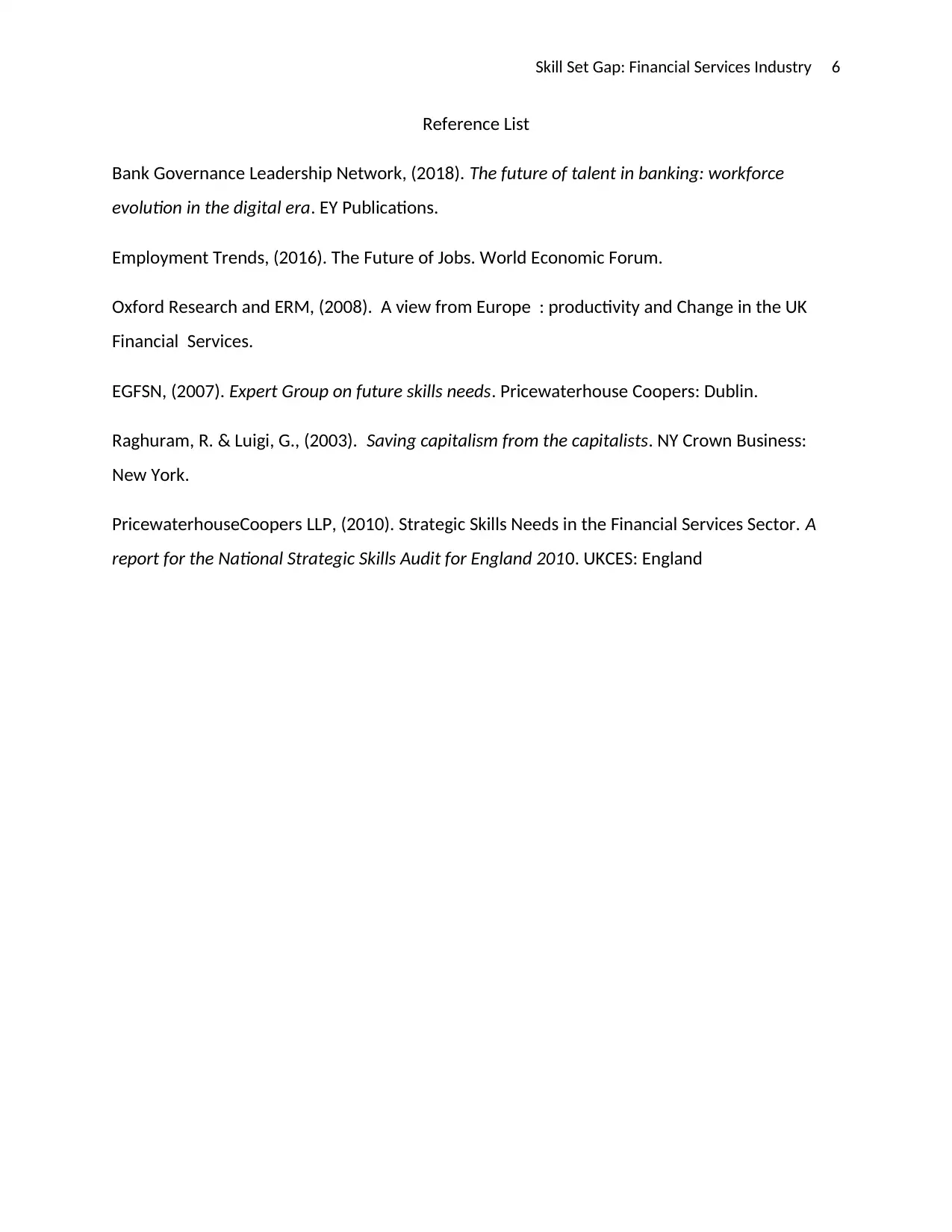
Skill Set Gap: Financial Services Industry 6
Reference List
Bank Governance Leadership Network, (2018). The future of talent in banking: workforce
evolution in the digital era. EY Publications.
Employment Trends, (2016). The Future of Jobs. World Economic Forum.
Oxford Research and ERM, (2008). A view from Europe : productivity and Change in the UK
Financial Services.
EGFSN, (2007). Expert Group on future skills needs. Pricewaterhouse Coopers: Dublin.
Raghuram, R. & Luigi, G., (2003). Saving capitalism from the capitalists. NY Crown Business:
New York.
PricewaterhouseCoopers LLP, (2010). Strategic Skills Needs in the Financial Services Sector. A
report for the National Strategic Skills Audit for England 2010. UKCES: England
Reference List
Bank Governance Leadership Network, (2018). The future of talent in banking: workforce
evolution in the digital era. EY Publications.
Employment Trends, (2016). The Future of Jobs. World Economic Forum.
Oxford Research and ERM, (2008). A view from Europe : productivity and Change in the UK
Financial Services.
EGFSN, (2007). Expert Group on future skills needs. Pricewaterhouse Coopers: Dublin.
Raghuram, R. & Luigi, G., (2003). Saving capitalism from the capitalists. NY Crown Business:
New York.
PricewaterhouseCoopers LLP, (2010). Strategic Skills Needs in the Financial Services Sector. A
report for the National Strategic Skills Audit for England 2010. UKCES: England
⊘ This is a preview!⊘
Do you want full access?
Subscribe today to unlock all pages.

Trusted by 1+ million students worldwide
1 out of 6
Related Documents
Your All-in-One AI-Powered Toolkit for Academic Success.
+13062052269
info@desklib.com
Available 24*7 on WhatsApp / Email
![[object Object]](/_next/static/media/star-bottom.7253800d.svg)
Unlock your academic potential
Copyright © 2020–2026 A2Z Services. All Rights Reserved. Developed and managed by ZUCOL.





